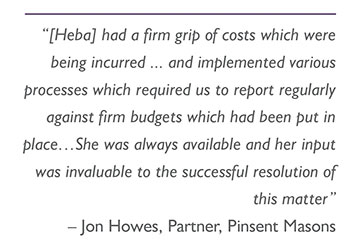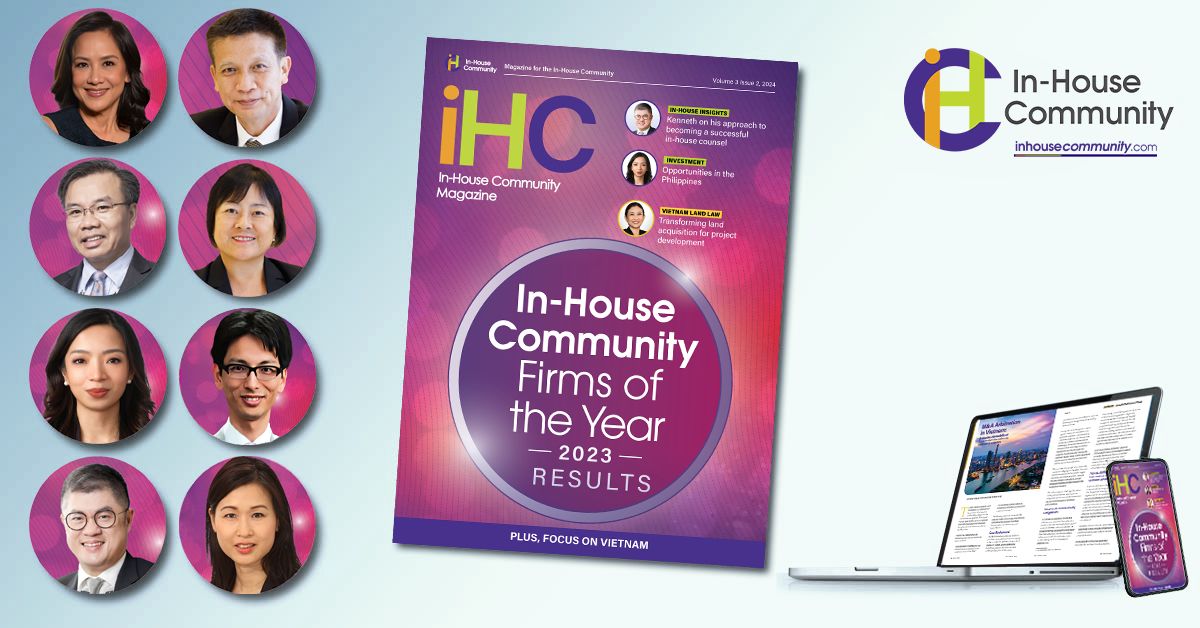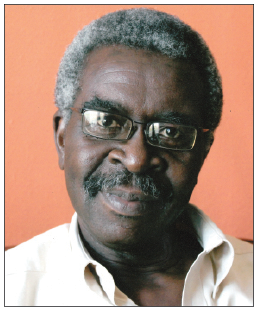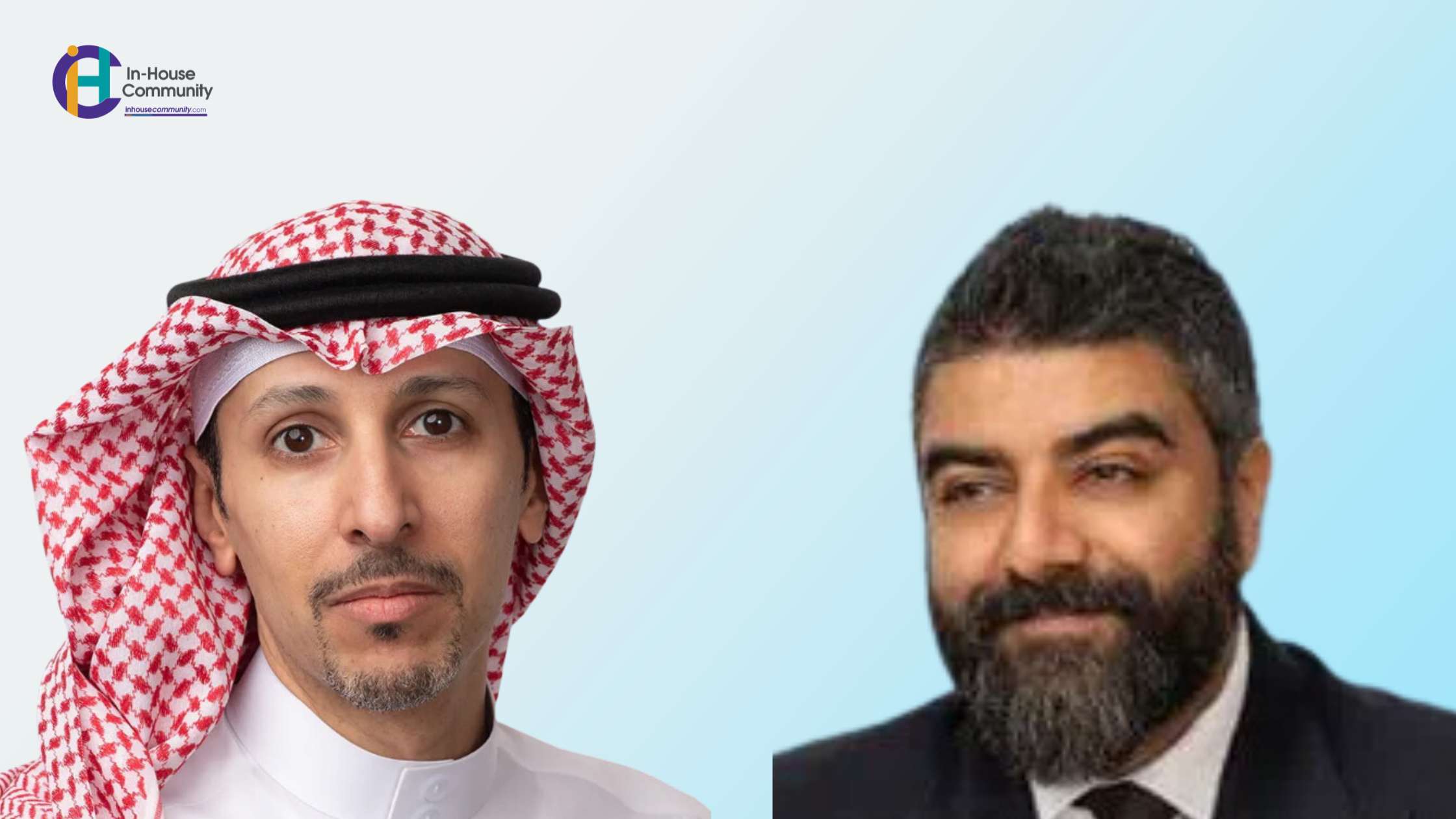Africa
Described by one of her peers as being “everything you would need in a lawyer”, Heba Ali was hired by Lenovo in 2014 to establish the organisation’s legal department for the Middle East and Africa region. A reflection of her success, in May, Ali was selected by our expert panel of judges as the In-House Community Counsel of the Year, 2016. Here she talks to Asian-mena Counsel about the qualities she thinks are vital to being a good in-house lawyer.
 ASIAN-MENA COUNSEL: How did your career lead you to your current role with Lenovo, and what is the scope of your role now? Heba Ali: It is very important, I believe, that one should see his or her career objectives as early as possible. While studying law (a bachelor’s degree at Alexandria University, and LLM at Robert H. McKinney School of Law, Indiana University), I had in mind that I wanted to be a business lawyer. I was therefore keen to acquire business, leadership and management skills. Subsequently, after graduation I chose to be trained as a business lawyer, and work with an international law firm that gave me an opportunity for international exposure. After working as an associate at Crowell & Moring in association with Hegazy & Associates in Cairo, I joined Olive Group Capital, a leading global provider of risk management, protective security, technology solutions and HSSE support services and products to the oil and gas industry, as a corporate in-house counsel.My experience in both private as well as in-house practice, the combination of my common law and civil law backgrounds, my ability to practise law in English and Arabic fluently, and the variety of exposures I dealt with, combined with deep skills in different fields and industries, products and services have all contributed to my career achievements.My role at Lenovo is to provide all-round business-focused legal support to the Middle East and Africa region including cross-border transactions, dispute resolution, corporate matters, anti-trust, acquisitions, government interaction, compliance and employment matters.AMC: Describe if you can the nature of the relationship between yourself as counsel and the business teams you work with. Is there such a thing as a ‘typical day’ for you at Lenovo? HA: Each day at Lenovo is unique. The term ‘typical day’ does not appear to exist in describing my relationship with the business team. Lenovo is an extraordinary and dynamic organisation. A legal counsel for an organisation of this nature must be ‘switched on’ and able to interact with the team with an ‘innovation’ – as opposed to a ‘typical day’ – approach.I am valued by the top leaders in the organisation because of my deep involvement in the business, which ensures that my legal advice is business-focused. I consider and analyse legal information and advice deeply in order to translate them into practical business-oriented advice to guide the business teams and contribute to their success. It is a prerequisite to understand the business input and its needs before I render any advice. I am always keen to be sure that the business team understands the rationale behind my advice rather than just providing a ‘yes’ or ‘no’ response. This helps the business team to consider the legal risks in assessing the commercial risks; it also encourages them to come up with innovative solutions to overcome legal obstacles. I do everything reasonably possible to remove barriers between legal risks and commercial risks. I collaborate with the team to embrace better ways of doing things. I actively take on tasks, own problems and find solutions. |
 AMC: What are the biggest obstacles you’ve faced in your role, and what qualities do you think are most important to be a successful in-house counsel? HA: One of the biggest challenges was establishing the legal department in the Middle East and Africa (MEA). The MEA region is unique and challenging in many respects. I established processes and local guidelines to address legal gaps that are specific to the region. I had to start from scratch and, having succeeded, I am now part of the Middle East and Africa leadership team.I think it is very important for an in-house counsel to observe the legal community around them to gather new insights and ideas: look broadly, both internally and externally, to seek out new information and ways of thinking. We should learn from both successes and mistakes to improve and innovate. Also, an in-house counsel should take feedback openly, and continuously search for better ideas. Conflicting views can always encourage new and better ways of working.Integration with the business is key. Being part of the business, rather than a disconnected person approving and rejecting documents, is an essential requirement. Close the gap by translating the legal views into practical business-oriented guidance that enables success. The in-house lawyer should be a business enabler rather than a blocker or an obstacle.Efficiency of course cannot be forgotten as an important quality that an in-house lawyer must have. The business environment nowadays is very fast. Further, legal expenses are always a concern in any business. The more talented the in-house lawyer is in negotiating external legal expenses the more value he or she brings to the business. Lawyers need to constantly look for opportunities to improve delivery time, cost and quality.Last but not least, an in-house counsel should always look for self-improvement. You need to challenge the norms and find areas of improvement for yourself and your work.AMC: What is the current composition of your in-house team, and how much do you liaise and work with your in-house legal counterparts in Lenovo around the world? HA: I believe that our legal team is uniquely structured to achieve the best efficiency. The team keeps balance through a combination of broadness and depth. My EMEA Legal Team is compromised of regional lawyers like myself who cover a geographical region, and lawyers who provide legal support in specialty areas. I liaise and work with the team members around the world on daily basis. Balancing the organisational structure and client service is fundamental to the success of any legal department. In my team, each client knows exactly whom to call within the legal department. |
 AMC: You’ve been credited for reducing the legal spend at Lenovo, but you clearly maintain a good relationship with the external counsel you work with. What qualities do you look for in external counsel? Are there any criteria you follow in selecting suitable practitioners and firms? HA: The magic combination of delivery time, cost and quality is my criteria in selecting external counsels … Reducing legal spend does not mean that the in-house lawyer bargains with the aim to have an unfair or unbalanced deal with the external counsel. By contrast, I am keen to see that the external counsel is content with his or her fee arrangement. The reducing of legal spend is actually a result of my involvement in every single detail in the case file so I deliver whatever I can to save the time spent by the external counsel.In addition, I tend to establish long-term relationships but at the same time, I always look for improvements and new legal talents in the market.AMC: What changes do you expect to see in the legal industry in the coming 5-10 years, especially in terms of the impact of technology? HA: I can see in-house counselling increasing and the use of external counsel decreasing. The legal marketplace is changing, and I foresee a future of online virtual and offshore legal vendors. In addition, I can foresee that the ‘billable hours’ model is disappearing somewhat. Alternative billing models that are more certain, such as fixed or capped fees, are becoming more dominant and are preferable. |
 AMC: Your role is clearly a demanding one. How do you maintain a good work/life balance? Is there anything you pursue outside of work (hobbies, sport, etc) that you think help you in that regard? HA: It is very important to have this balance. Unfortunately, it is not always easy, especially for lawyers. However, my husband and I always push hard to have this balance in our life. For example, through art. I enjoy painting (mainly acrylic on canvas), handicrafts and contemporary dance. I like learning new things. My next plan is to learn to play the accordion.AMC: How does it feel to have been selected by our panel as the In-House Community Counsel of the Year? HA: I feel very proud and rewarded.AMC: What’s the best advice you’ve ever received, and what advice would you impart to someone starting out in their in-house career? HA: Always think like a shareholder. Remember that the key difference between an in-house lawyer and an external lawyer is the integration with the business. The biggest mistake is to disconnect legal issues from commercial issues. Strive to be a business enabler not a potential blocker. Challenge the norms to look for improvements. |
 About Lenovo Lenovo is one of the world’s leading technology companies. It is a global Fortune 500 company with approximately 55,000 employees and customers in 160 plus countries, and a leader in providing innovative consumer, commercial, and enterprise technology around the world. The company has achieved tremendous growth in its business to become the world’s number 1 PC manufacturer, and number 3 in smartphones, number 3 in tablets and number 3 in servers and storage. Lenovo’s global investments and acquisitions include IBM and Motorola in the US, NEC in Japan, Medion in Germany. Lenovo’s two global headquarters are located in North Carolina and Beijing. It has major research centers in the US, Japan and China; and manufacturing plants in North Carolina, Mexico, India, China and Brazil. |
Latest Updates
IHC Magazine: April 2024 issue featuring Firms of the Year 2023 Results
As we round off the first quarter of this year, we are proud to showcase our IHC Firms of the Year for 2023. These firms have been selected by our IHC community in recognition of their invaluable contribution to their clients’ ...
Related Articles
Related Articles by Jurisdiction
Local content and participation in Ghana’s electricity supply industry
In line with the national push for a more structured approach to increasing local content and participation, the Regulations came into force on December 22, 2017 ...
FDI laws in Libya
A stark reminder of the fluidity of the legal and practical landscape ...
Further transparency in respect of Cayman Islands companies
The Cayman Islands has often been referred to pejoratively as a “secrecy jurisdiction”. The two main supports for the secrecy allegation were on the one hand the existence of “secrecy” legislation, The Confidential Relationship Preservation Law (CRPL) dating back to ...
Latest Articles


















